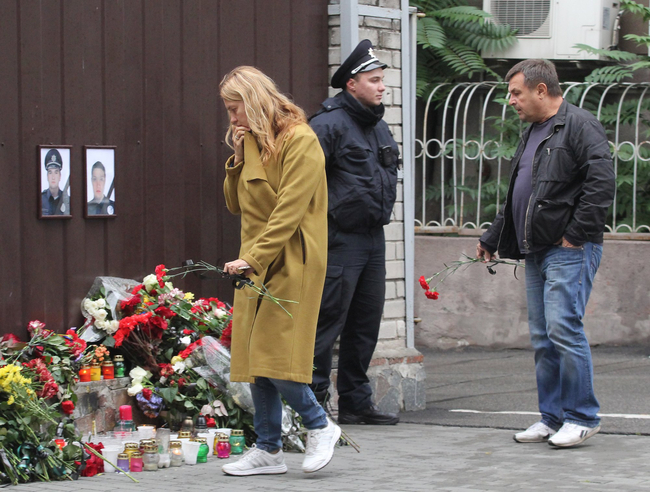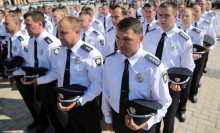Oleksandr Puhachov, suspected of murder of two police patrol officers in Dnipro, is facing life imprisonment according to the Criminal Code of Ukraine. This incident has become the pretext for Arsen Avakov, the Minister of Internal Affairs, to write a Facebook post about the “imperative presumption of the police’s rightness.” Avakov said that this belief in law enforcement’s infallibility should become a social norm. He considers it to be not a restriction of civil rights but a guarantee for public safety.
After the tragedy in Dnipro, the social media has seen waves of discussion about the quality of police work and the reform in law enforcement in general. Even the old topic of dismissed volunteers has received some attention, as the first data suggests that Puhachov was a member of Tornado battalion and was even born in Russia. On the one hand, such cases should certainly be investigated thoroughly before any conclusions can be made, especially that since the Soviet times the law-enforcement officers’ self-defense often brought more problem for them; every fired bullet requires a lot of paperwork, and an officer can easily fall under sanctions within their own agency. Thus, regardless of the officer’s time of reaction and professionalism, they have a trail of bureaucratic moments restraining them. On the other hand, there have been cases of the police chasing and shooting an innocent man on the streets of Kyiv, or, recently in Mykolaiv, apathetically watching a person getting beaten. After all, the murder of two policemen in Dnipro compels us to think – if the police are to protect civilians, who is to protect the police themselves?
First of all, there is an issue of to which extent the police reform is adequate to the current state of affairs. Let’s not forget that we are living in times of war, and that the criminal situation is directly related to the conditions of war as the society faces a combination of different psychiatric syndromes and the large quantities of illegal weapons. Second, there is the issue of eventually legalizing firearms for self-defense. An interesting point in this case can be seen in the video: a van driver had tried to stop the criminal, but was forced to retreat from the armed attacker. Third, the question remains about the procedure for the police officers’ use of weapons. It appears that one cop can fire left and right in the city center at high speed, and others at the time of urgency have to consider and calculate all the possible complications and thereby lose precious seconds.
We can confidently say one thing – if the police reform changes only superficial things and creates more an illusion than the real development, sooner or later Ukraine will face an avalanche of crime problems. We should remember, for example, the police’s problem with using special ammunition during the events of spring 2014 in the Donbas, when the guards defending the buildings were not allowed to use not only weapons, but also batons. At that time, the police was officially permitted to use shields only. In addition, the prosecution of law-enforcement officers for the events on Maidan has psychologically pressured other members of police and Special Forces, thereby hindering their will to act, or even creating a background for desertion. All these are the signs of inability to work with personnel and the absolute lack of awareness of strategic objectives. The imitation of reform and creative experiments during the war can lead to negative consequences piling up.

SEPTEMBER 26, 2016. DNIPRO / UNIAN photo
“THE PROBLEM IS THAT DEKANOIDZE IS DEAF TO ARGUMENTS”
Vitalii KUPRII, MP:
“I believe that the blood of these police officers is on the hands of the National Police boss. In this regard, I have made a number of statements. I personally spoke to her, as well as to the current Prosecutor General Yurii Lutsenko, who was then still an MP working in the parliamentary Committee on Law Enforcement, about the fact that we had the data on insufficient police training. Two months of preparation are not enough to provide the appropriate training for a law-enforcement officer and to prepare them morally and psychologically. The first discussion on this subject took place in early February, when the Committee on Law Enforcement has had a public debate on the incident when a policeman had killed the passenger of a BMW. Khatia Dekanoidze did not respond to our concerns. On the contrary, she was emotional and did not hear the arguments, talking about us allegedly slowing down the reform in law enforcement. Such behavior of a person who has to listen to every argument, especially in the period of reform, is the reason of these tragic cases. The Patrol Police agencies in oblasts are not the subject of the National Police heads in the regions, they report directly to Dekanoidze. This makes it impossible to effectively conduct joint training, share experience, and more.”
“THERE IS A PROBLEM OF EFFECTIVELY USING A WEAPON AMONG THE LAW-ENFORCEMENT OFFICERS”
Yevhen ZAKHAROV, human rights activist:
“The tragedy like that in Dnipro could have happened anywhere and anytime. It is not a reflection of any flaws in the reforms of law-enforcement system. Especially if we consider that the police officer in this case had managed to fire a shot and wound the perpetrator. Consequently, the attacker was found in the hospital. Certainly, such cases are the reason to make some conclusions, because we must always learn. But no talk of systemic weaknesses is necessary here. It happened that the patrol encountered an attacker who has already been wanted for other crimes. I have to agree that there is indeed a problem with effectively using a weapon among the law-enforcement officers. In the US, for example, it is much easier – police officers there can use a weapon at the slightest suspicion. There was even a case when the police have fired at a person who simply did not understand English; the person thought that the police had asked for the documents and put a hand in the pocket to get them. The police fired their guns, thinking that that person had reached for a weapon.”








